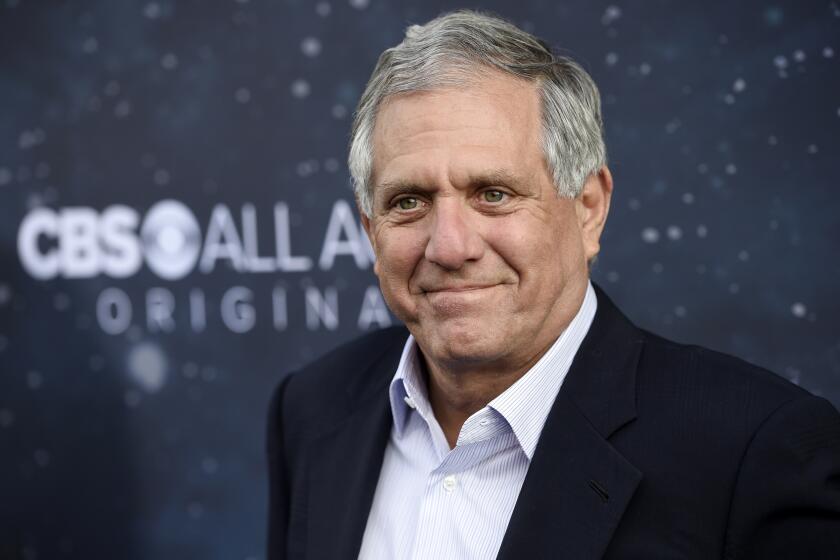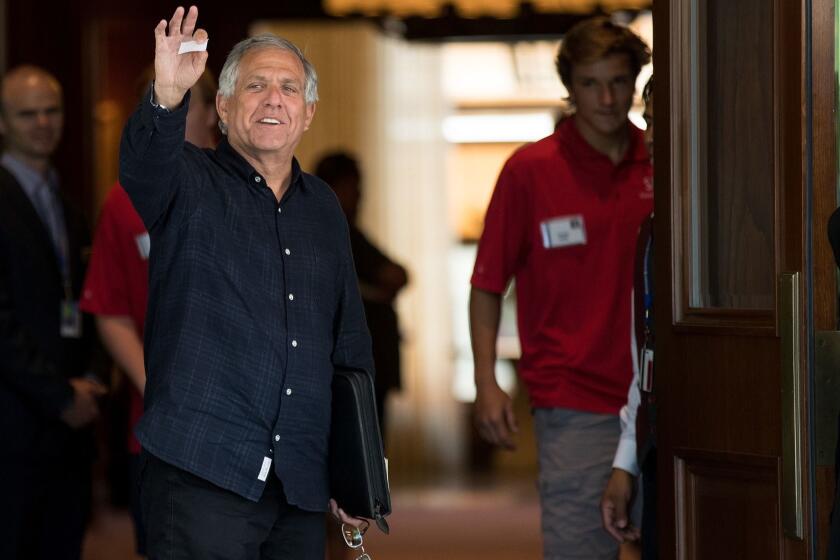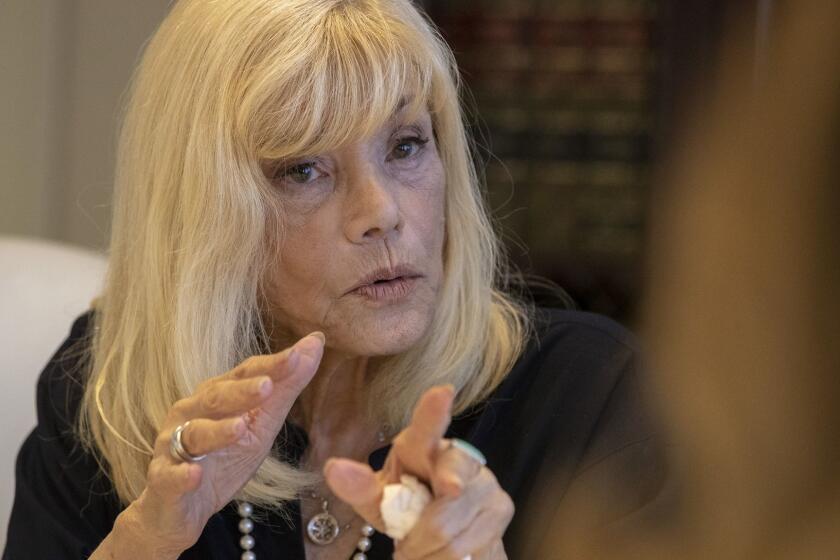LAPD cover-up of claims against ex-CBS boss Moonves highlights challenges for abuse victims
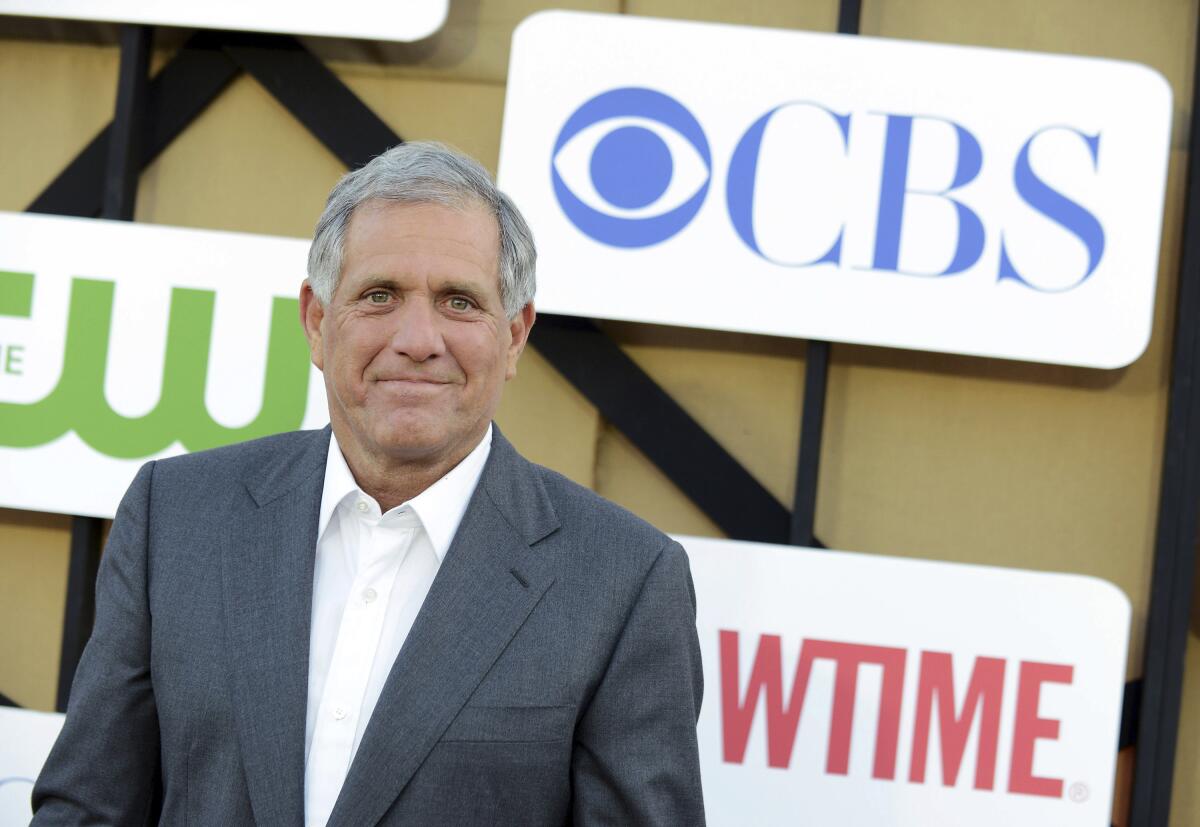
- Share via
For two decades, Leslie Moonves was the toast of Hollywood — the maestro who turned a moribund CBS into “America’s most-watched network.”
But the #MeToo movement brought him down. Engulfed in a sexual abuse scandal, the CBS chief was forced out in September 2018, nearly a year after Harvey Weinstein became a pariah when dozens of women came forward with assault and rape allegations.
This week, New York Atty. Gen. Letitia James released a report revealing the lengths to which Moonves and his lieutenants, attorneys and a high-level Los Angeles Police Department captain went to keep the executive in power. The group conspired for months to conceal damaging reports of alleged sexual abuse that they knew would destroy his career, according to the report. Even several CBS board members, who were aware of the abuse allegations, maintained support for the television titan.
“The police cover-up, that was shocking,” said Jim Gottlieb, the son of the accuser who went to the LAPD in 2017 to report a decades-old sexual assault.
The revelations also stunned attorneys, victims’ advocates and observers, who said it was emblematic of the immense challenges women still face as they seek to level the gender playing field and bring complaints of misconduct amid fierce resistance from powerful interests, such as CBS and the LAPD.
“What is so jarring about this case is how clearly it lays out how these powerful men colluded to cover up a gender-based crime,” said Caroline Heldman, an Occidental College professor of critical theory and social justice. “This is one of myriad reasons why survivors don’t come forward — we know that we’re not going to get a fair shake with law enforcement.”
The scandal is likely to further debate about the effectiveness of the #MeToo movement five years after it became a global phenomenon. There have been legislative victories, but also many setbacks. And striking differences remain reflected in opinions on gender equality. A Kantar Public and Reykjavik Global Forum report this year found that 64% of men in the U.S. believed that women had achieved equality, while only 54% of women held that view.
The Moonves cover-up began hours after Phyllis Golden-Gottlieb, 81, walked into the LAPD’s Hollywood station Nov. 10, 2017, to report that Moonves had sexually assaulted her in the 1980s. That night, LAPD Capt. Cory Palka called a CBS executive to alert him to the existence of the report.
“Somebody walked in the station about a couple hours ago and made allegations against your boss regarding a sexual assault,” the police captain said that night in a voicemail message left for Ian Metrose, then the senior vice president of talent relations at CBS, according to the report.
“It’s confidential, as you know, but call me,” Palka said.
The attorney general announced that CBS and Moonves would pay $30 million, with much of the money going to CBS shareholders.
Palka quickly began working in tandem with Moonves, Metrose and other high-level CBS executives. In the coming weeks, he and others at the LAPD made sure the report was buried and that Moonves’ accuser, Golden-Gottlieb, stayed quiet, according to the attorney general’s report.
“The LAPD Captain assured [CBS executives] that he had spoken to his contacts within the LAPD and implemented controls to prevent news of the Police Report from leaking to the press,” the report said.
Early on, the captain secretly provided Moonves and CBS executives with a copy of the police report, which included personal details about Golden-Gottlieb and her allegations, the report said. (Golden-Gottlieb died in July.)
“It is shocking that a high-level captain in the LAPD decided to reveal a victim’s complaint, and chose to help a big corporation at the expense of a woman who alleged to law enforcement that she had been sexually assaulted,” said lawyer Gloria Allred, who represented Golden-Gottlieb.
Leslie Moonves was a television great.
LAPD Chief Michel Moore this week expressed his dismay.
“What is most appalling is the alleged breach of trust of a victim of sexual assault, who is among the most vulnerable, by a member of the LAPD,” Moore said. “This erodes the public trust and is not reflective of our values as an organization.”
Five days after Golden-Gottlieb filed her report, Palka — who was in charge of the department’s Hollywood Division — texted Metrose and Moonves’ personal attorney, saying he’d been in contact with the officer investigating the alleged assault.
Palka wrote that the investigator would “make contact & admonish the accuser tomorrow about refraining from going to the media and maintaining ‘her’ confidentiality” and “honoring the integrity of the investigation,” the report stated.
“That captain had a sophisticated understanding of how he needed to suppress the survivor,” Heldman said. “His goal was to make sure that other women didn’t come forward [knowing] that when one survivor goes public it could inspire others to come public.”
Palka has since retired from the department. He has not responded to multiple requests for comment. The LAPD said it has launched an internal investigation to review whether other officers were involved.
Moonves, who this week declined to comment through a spokesman, has denied the allegations. Metrose declined to comment.
In the mid-1980s, Golden-Gottlieb was a TV show development executive at Lorimar Productions, the Culver City studio behind “Dallas” and “Knots Landing.” Then, Moonves was an up-and-coming Lorimar executive in charge of TV movies, and he invited her to lunch.
Golden-Gottlieb recalled in a 2018 interview with The Times that, instead of driving to a restaurant, Moonves allegedly parked on a side street, forcibly grabbed her head and slammed it into his crotch, then ejaculated into her mouth.
Jim Gottlieb recalled his mother mustering the courage to report the incident in the early, electric days of the #MeToo movement. She made the report about a month after the New York Times and the New Yorker first exposed Weinstein’s alleged crimes.
Golden-Gottlieb had long been haunted by her encounters with Moonves, her son said.
“She told me for years about how badly Les Moonves had treated her, and that he had once thrown her up against the wall,” Gottlieb said Thursday. “Every time she saw him on the news, it grated on her.”
For more than 30 years, Phyllis Golden-Gottlieb has been unable to erase the memories of encounters with Leslie Moonves, the once-powerful chief executive of CBS Corp.
Los Angeles County prosecutors declined to bring charges because the statute of limitations had expired.
The attorney general’s report noted that when CBS executives received information about Golden-Gottlieb in 2017, they went to work “investigating the victim’s personal circumstances and that of her family.”
CBS ran background checks on Golden-Gottlieb and her family. One text message that circulated among CBS executives provided Jim Gottlieb’s name, address and phone number. CBS’ then-chief human resources officer, Anthony Ambrosio, wrote in a text message: “Need to research if neighborhood gives clues to need for $,” according to the report.
“She wasn’t out to get money, or anything,” Gottlieb said, noting that his mother initially had been reluctant to speak to investigative reporter Ronan Farrow, who was first to report the Moonves allegations, due to fears that the powerful Moonves might sue her.
He also noted the Gottlieb family has long wondered why the LAPD asked his elderly mother to travel to a police station in the San Fernando Valley to be interviewed by a detective rather than closer to her Park La Brea home.
“She initially went to the Hollywood Division to file her complaint against Moonves; the case was assigned to a detective in the Mission Hills Division, requiring her to drive all the way out there for the interview,” Gottlieb said, noting that his mother did a “practice drive” the day before the interview to make sure the trip would go smoothly.
“Now I wonder if this was part of the attempt to cover it up,” Gottlieb said.
On Friday, LAPD Capt. Kelly Muniz said the internal review had just been opened and it was “too early in this investigation” to discuss the location or other details of Golden-Gottlieb’s interview.
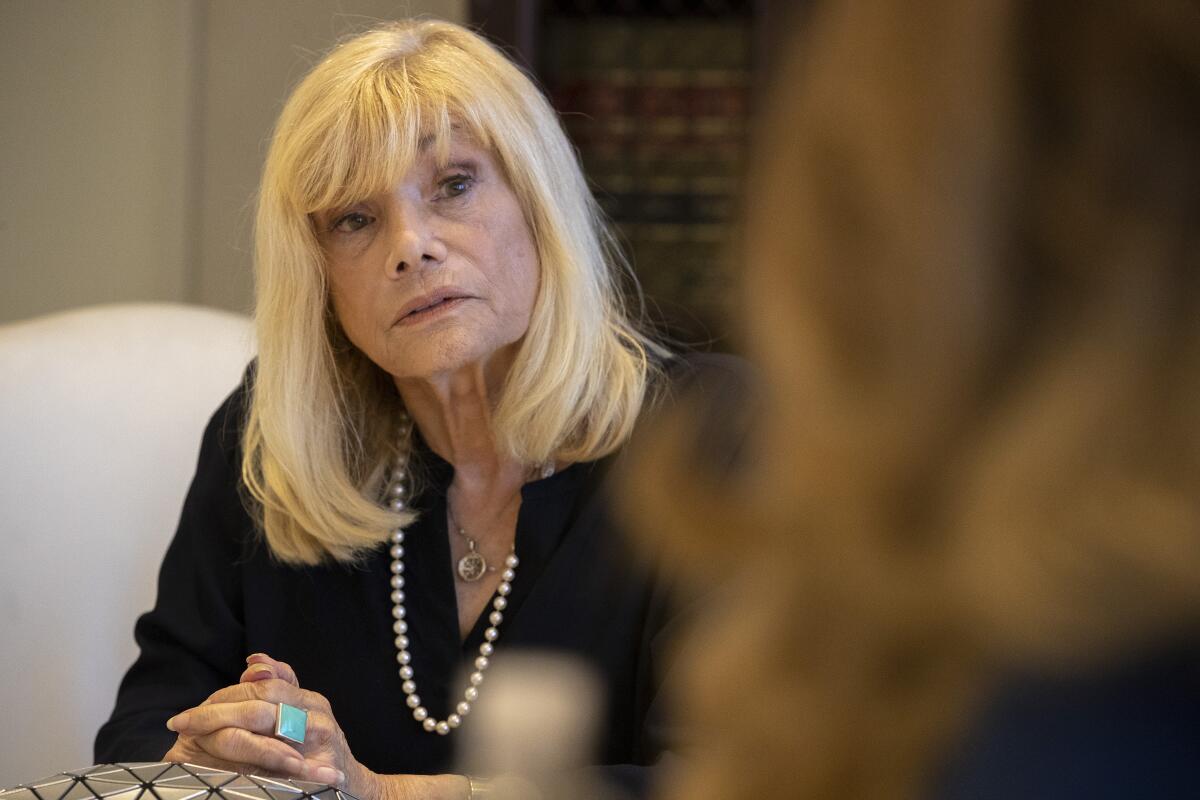
CBS’ parent company, Paramount Global, and Moonves earlier this week agreed to a $30.5-million settlement with James’ office to resolve law violations in 2017 and 2018. Moonves will provide $2.5 million of that amount. About half of the money will be paid to CBS shareholders who sued four years ago, alleging CBS illegally hid sensitive information about the magnitude of the sexual harassment problems.
Investors have long maintained CBS should have disclosed its secrets because Moonves was pivotal to the company’s success. The scandal affected the company’s stock, with the attorney general’s report noting that CBS’ shares dropped 10% after the news of the Moonves assault allegations.
The New York attorney general began investigating the matter to determine whether CBS’ actions had violated state business laws.
In the aftermath of James’ report, activists for survivors said the scandal highlighted challenges facing the #MeToo movement.
“Changing culture is a monumental task,” activist Gretchen Carlson said Friday. “This all comes back to power. Usually the survivor is not holding the power — the only way the survivor holds the power is if they have a voice.”
Carlson, the former Fox News anchor who famously sued the network’s powerful head, Roger Ailes, paving the way for his ouster, now advocates for women through her organization, “Lift Our Voices.”
After #MeToo became a global phenomenon, Time’s Up, the high-profile Hollywood group of women, last year was flattened by reports that key leaders sought to protect Andrew Cuomo, the former New York governor who was forced to resign after an investigation by James’ office.
Women continue to fight for standing in the workplace and accusers continue to struggle for their stories to be heard.
For example, the U.S. Senate in 2018 narrowly approved then-President Trump’s nomination of Brett Kavanaugh to the U.S. Supreme Court despite allegations that he’d sexually assaulted a female classmate years before. Kavanaugh denied the claims.
“The value of #MeToo is that it brought a lot of attention to the extent of sexual violence and misconduct,” said Scott Berkowitz, founder and president of RAINN, the nation’s largest anti-sexual violence organization. “It encouraged more people to come forward and inspired a lot of companies to improve the way they treat people making allegations and improve the fairness of investigations.”
The LAPD-CBS-Moonves cover-up “is a frustrating reminder that progress isn’t a straight line,” Berkowitz said. “Clearly, we are nowhere close to fixing the problem.”
Carlson said legislative victories this year have made her optimistic. In March, a bill that she championed that bars forced arbitration in sexual assault and harassment complaints was signed into law by President Biden.
“It takes courage to come forward in these situations,” Carlson said. “It’s only from reporting stories like this and exposing these situations that we continue to make progress.”
Times staff writer Richard Winton contributed to this report.
More to Read
Inside the business of entertainment
The Wide Shot brings you news, analysis and insights on everything from streaming wars to production — and what it all means for the future.
You may occasionally receive promotional content from the Los Angeles Times.
